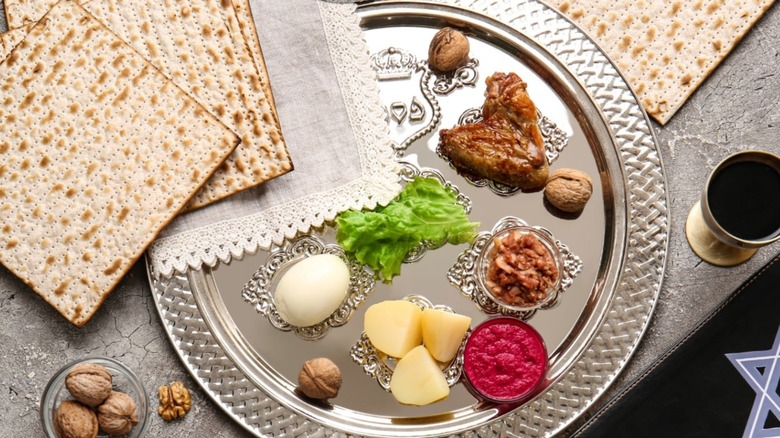The World's Largest Passover Seder Isn't Where You Think
Passover is upon us and the traditional Seder Plate will soon be placed at the center of the table, while the storyteller gets the traditional practice started. Many communities, large and small, will be partaking in this sacred event, and while you might assume that the largest Passover Seder would be in Israel or somewhere else with a large Jewish population, you'd be wrong. The biggest Seder actually occurs in Kathmandu, Nepal. As the Kathmandu Post explained in 2019, this is due to the fact that it has become the location for Jewish backpackers to stop by if they happen to be in Asia during Passover. The Atlantic writes that Nepal is a popular destination for Israelis, as it leads to the Himalayas.
In 1989, the Israeli Embassy in Nepal decided to host a Seder for all who could not celebrate Passover with their friends and family. Chabad reports that even in pre-internet times, word reached all throughout Asia and attracted over 500 participants, exceeding the expected number of 30 to 40 attendees. As years passed, the numbers only grew. Per the Kathmandu Post, by 2005, the feast was celebrated by 1,500 people and over 2,000 in the years following the 2015 earthquake.
The difficulties of hosting the Kathmandu Seder
Hosting a Seder that primarily serves people not connected to the local area has proven a logistical challenge worthy of the supply chain conversations that the pandemic inspired. This is because the food and wine for a Seder has to be kosher, which is difficult when you don't have a kosher supplier in the area.
Even in the beginning, Chabad shared, geopolitics made supplying the feast hard. "The matzah, kosher wine, and gefilte fish making its way from Israel was embargoed," Mendel Kastel, one of the Rabbinical students who helped with the first Kathmandu Seder, described. The issue was that India and Nepal were having a row.
The team that runs the Seder orders over 1,500 pounds of matzah and 1,000 bottles of wine, yet can still run into issues, which the co-director of the Chabad Center, Chani Lifshitz, listed. She recalls, "One time the truck fell down in India, and a helicopter had to bring the stuff. Another time the shipment arrived in Malaysia by mistake and didn't make it to Nepal until one week after Pesach."
Kosher rules also pushed them to make their own wine in Nepal, as Lifshitz told NPR. Simply importing all that wine proves too much of a headache and because you could drink four cups of wine for Seder, it's not something that should be left up to chance.

